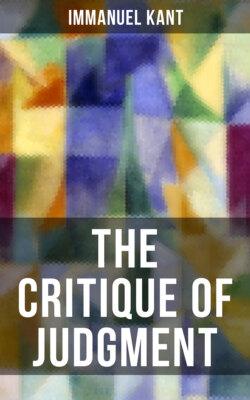Читать книгу THE CRITIQUE OF JUDGMENT - Immanuel Kant - Страница 9
На сайте Литреса книга снята с продажи.
IV. OF JUDGEMENT AS A FACULTY LEGISLATING A PRIORI
ОглавлениеTable of Contents
Judgement in general is the faculty of thinking the particular as contained under the Universal. If the universal (the rule, the principle, the law) be given, the Judgement which subsumes the particular under it (even if, as transcendental Judgement, it furnishes a priori, the conditions in conformity with which subsumption under that universal is alone possible) is determinant. But if only the particular be given for which the universal has to be found, the Judgement is merely reflective.
The determinant Judgement only subsumes under universal transcendental laws given by the Understanding; the law is marked out for it, a priori, and it has therefore no need to seek a law for itself in order to be able to subordinate the particular in nature to the universal.—But the forms of nature are so manifold, and there are so many modifications of the universal transcendental natural concepts left undetermined by the laws given, a priori, by the pure Understanding,—because these only concern the possibility of a nature in general (as an object of sense),—that there must be laws for these [forms] also. These, as empirical, may be contingent from the point of view of our Understanding, and yet, if they are to be called laws (as the concept of a nature requires), they must be regarded as necessary in virtue of a principle of the unity of the manifold, though it be unknown to us.—The reflective Judgement, which is obliged to ascend from the particular in nature to the universal, requires on that account a principle that it cannot borrow from experience, because its function is to establish the unity of all empirical principles under higher ones, and hence to establish the possibility of their systematic subordination. Such a transcendental principle, then, the reflective Judgement can only give as a law from and to itself. It cannot derive it from outside (because then it would be the determinant Judgement); nor can it prescribe it to nature, because reflection upon the laws of nature adjusts itself by nature, and not nature by the conditions according to which we attempt to arrive at a concept of it which is quite contingent in respect of these.
This principle can be no other than the following: As universal laws of nature have their ground in our Understanding, which prescribes them to nature (although only according to the universal concept of it as nature); so particular empirical laws, in respect of what is in them left undetermined by these universal laws, must be considered in accordance with such a unity as they would have if an Understanding (although not our Understanding) had furnished them to our cognitive faculties, so as to make possible a system of experience according to particular laws of nature. Not as if, in this way, such an Understanding must be assumed as actual (for it is only our reflective Judgement to which this Idea serves as a principle—for reflecting, not for determining); but this faculty thus gives a law only to itself and not to nature.
Now the concept of an Object, so far as it contains the ground of the actuality of this Object, is the purpose; and the agreement of a thing with that constitution of things, which is only possible according to purposes, is called the purposiveness of its form. Thus the principle of Judgement, in respect of the form of things of nature under empirical laws generally, is the purposiveness of nature in its manifoldness. That is, nature is represented by means of this concept, as if an Understanding contained the ground of the unity of the manifold of its empirical laws.
The purposiveness of nature is therefore a particular concept, a priori, which has its origin solely in the reflective Judgement. For we cannot ascribe to natural products anything like a reference of nature in them to purposes; we can only use this concept to reflect upon such products in respect of the connexion of phenomena which is given in nature according to empirical laws. This concept is also quite different from practical purposiveness (in human art or in morals), though it is certainly thought according to the analogy of these last.
